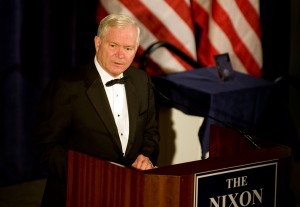


(DoD photo by Cherie Cullen/Released)
In a speech to the Nixon Center Wednesday, Secretary of Defense Robert Gates highlighted anew his proposal for “pooled authorities” for international security assistance to be funded and administered jointly by State and Defense – a proposal he originally made in a letter to Secretary Clinton in December. Congressional authority for this funding, known as 1206, will expire at the end of FY11, sparking debate about future budget authorities. “Whatever we do,” he emphasized, “should reinforce the State Department’s lead role in crafting and conducting U.S. foreign policy, to include foreign assistance, of which building security capacity is a key part.”
Gates argued the best way for the U.S. to defend against the threat of terrorist activities in failing and weak states is “building the capacity of other countries to provide for their own security.” This has meant a shift from the Cold War era, when the military “was designed to defeat other armies, navies and air forces, not to advise, train, and equip them.” He also noted the lack of military training and capacity building extended to Afghanistan and Pakistan in the decade prior to September 11th. Since then, the military has taken actions to enhance the focus on capacity building, including the Army’s transition to an advisory and training role in Iraq, Air Force efforts to help train and equip local partners, and the Navy’s work with African countries to improve their ability to combat smuggling and piracy off their shores.
Secretary Gates highlighted the need to modernize the U.S. foreign assistance apparatus to better address the challenges we face today, saying, “America’s interagency toolkit is a hodgepodge of jerry-rigged arrangements constrained by a dated and complex patchwork of authorities, persistent shortfalls in resources, and unwieldy processes.” Capacities for such funding are currently spread across the Pentagon and government as a whole. Secretary Gates argued that his proposal for pooled resources “would actually incentivize collaboration between different agencies of our government.” This also echoes recent findings of the Quadrennial Defense Review (QDR) that highlight the role of diplomacy and development in national security.
Gates went on to outline principles guiding his proposal for a “dual-key” mechanism for a pooled resources approach that he believes are essential to any effort to reform and modernize programs focused on increasing partner capacity:
His proposal for pooled resources was, in his words, a “starting point,” and the Secretary acknowledged concerns in the debate about foreign assistance. “I never miss an opportunity to call for more funding for and emphasis on diplomacy and development,” he observed, adding, “I also once warned publicly of a ‘creeping militarization’ of aspects of our foreign policy if imbalances within our national security system were not addressed.”
“When all is said and done,” he said, “there are limits to what even the United States can do to influence the direction of countries and cultures radically different than our own.”
Notifications